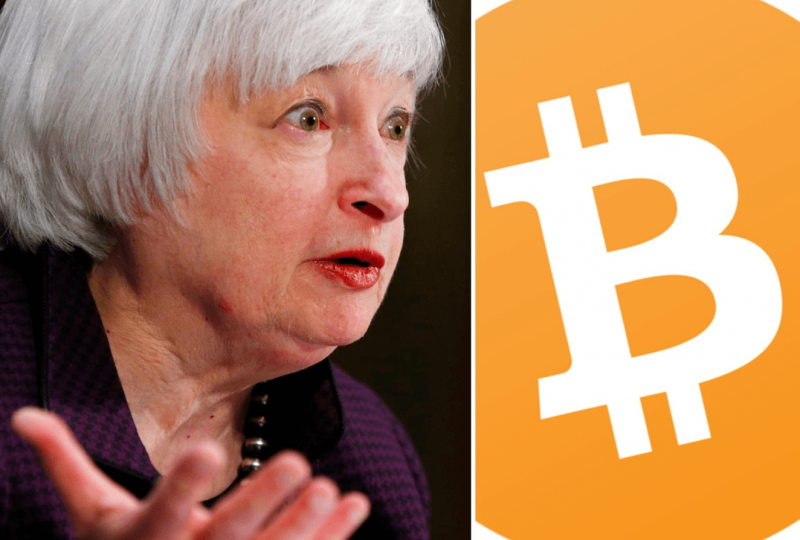Yellen: Crypto Regulation Should be Based on Risk
Apr 07, 2022

In a conference on regulating cryptocurrencies, Treasury Secretary Janet Yellen stated that regulation should be focused on risk rather than innovation, balancing the benefits digital assets may bring to our payment system with the hazards they provide.
"Wherever possible, regulation should be 'tech neutral,'" Yellen stated during a lecture at American University's Kogod School of Business Center for Innovation. "Whether assets are kept on a balance sheet or a distributed ledger, consumers, investors, and businesses should be protected from fraud and misleading statements."
President Biden issued an executive order last month calling for a whole-of-government approach to studying how to regulate cryptocurrency, with the Treasury tasked with conducting many of the research. As part of the president's directive, Yellen spelled forth her views and the Treasury's approach to digital assets and its work.
"I won't forecast where this effort will take us, but that doesn't imply we're navigating without a compass," Yellen added, referring to major technological lessons learnt throughout history. "While digital assets are relatively new, many of the challenges they raise are not."
Yellen highlighted that, although we should encourage its innovation, we must also guarantee that the expansion of digital assets does not allow for tragedies such to those that arose with the 2008 financial crisis, which had disproportionate effects on the economy and financial system.
Yellen stated that we must be prepared for future changes in the structure of financial markets, noting ideas that distributed ledger technology might reduce financial market concentration.
"While this may make markets less vulnerable to the loss of any single business," she added, "it is vital that we maintain insight into possible accumulations of systemic risk and continue to have effective instruments for tamping down excesses when they develop."
She emphasized that crypto exchanges cannot guarantee that if you swap your stablecoin back into a dollar, it would be done on demand and during times of stress, potentially resulting in a stablecoin run.
Based on the severity of the risks, the Treasury will make policy recommendations through regulation and law. It is already collaborating with Congress to advance legislation to regulate stablecoins and reduce risks to the financial system.
Yellen stated that Treasury's work, as well as the administration's crypto studies, will be examined through the lens of protecting consumers, investors, and businesses; safeguarding the financial system from risks; mitigating national security risks; and promoting the United States' global economic leadership.
The secretary emphasized that firms that keep customer funds should be required to ensure that those assets are not lost, stolen, or used without the customer's consent — something that the Securities and Exchange Commission is working on. She also added that in order to properly report their income to the IRS, people should get the same type of tax reporting information on crypto transactions as they do on equities and bonds.
Digital assets have developed rapidly, with a market worth of $3 trillion in November of last year, up from $14 billion just five years earlier. They've since retreated and currently have a market cap of roughly $2 trillion.
Using the early 1990s launch of the Internet as an analogue for crypto, Yellen stated that while digital assets are new, they are part of a bigger trend of financial digitalization that has been in the works for decades.
Yellen also stated that while supporters of digital assets believe they may help establish a more efficient payment system with immediate transactions and cheaper prices, she believes it is too early to know if the technology will deliver.
"Will the technology perform on its promise?" "I believe it is too soon to say," Yellen remarked. "Problems such as processing time, cost, and technical impediments to access must be addressed."
For the time being, Yellen stated that the unpredictable pricing of bitcoin and other cryptocurrencies have prevented them from becoming widely accepted payment methods. Yellen also warned that high costs and lengthy processing times might make utilizing bitcoins as a payment method unfeasible.
"In practice, you'd have a hard time using cryptocurrencies to purchase a sandwich or a gallon of milk," she added, stressing that stablecoins or possible Central Bank Digital Currencies might become more commonly utilized as a method of exchange, bringing potential advantages and hazards.
In describing how the Treasury views a CBDC, Yellen stated that a CBDC might assist in establishing a more efficient payment system and could become a kind of trusted money analogous to physical currency.
According to Yellen, the United States must decide whether to implement a CBDC in light of the dollar's pivotal position in the global economy. For worldwide trade and finance, the dollar is the most extensively used currency. It accounts for about 90% of one side of foreign currency transactions, while US dollar-denominated assets account for approximately half of cross-border bank claims.
"I'm not sure what conclusions we'll reach yet," Yellen added, "but we must be clear that issuing a CBDC would certainly offer a huge design and engineering challenge that would need years of development — not months. As a result, I share the President's urgency in advancing research to better understand the difficulties and possibilities that a CBDC may provide to American interests."
The Treasury is spearheading a report on the future of money and payments under the guidance of the president's executive order. The paper will examine various CBDC design options and their consequences for payment systems, economic development, financial stability, financial inclusion, and national security.




